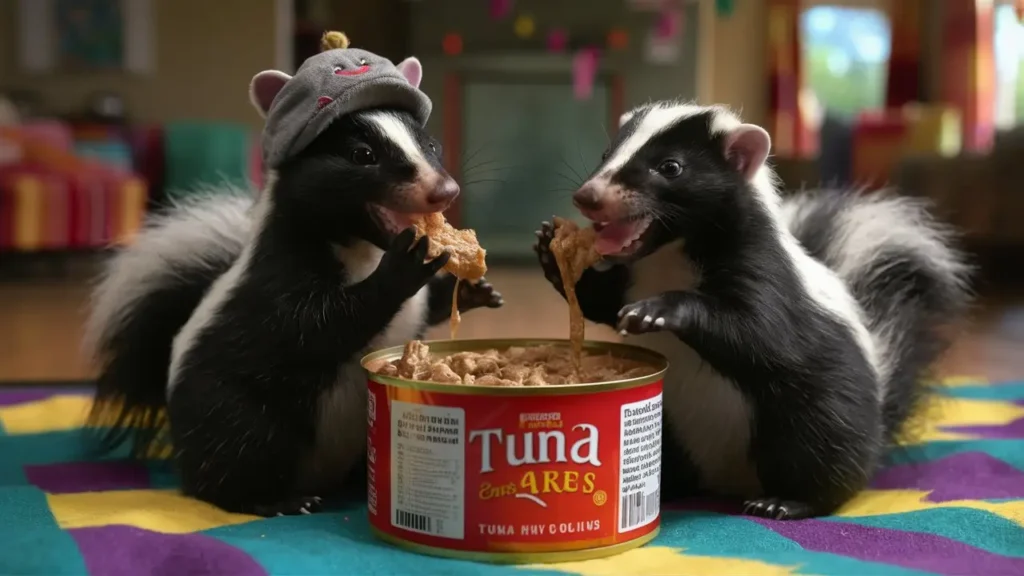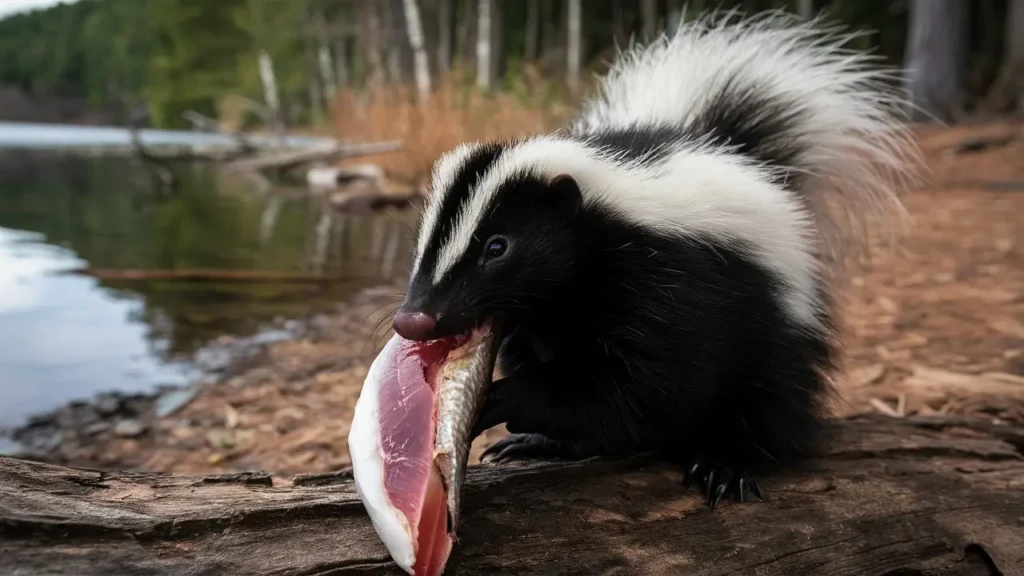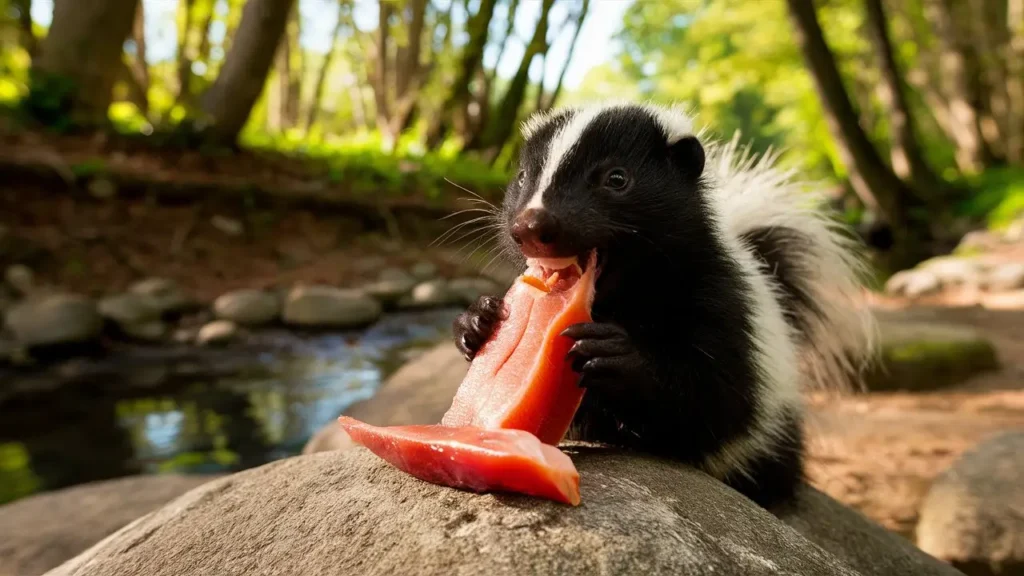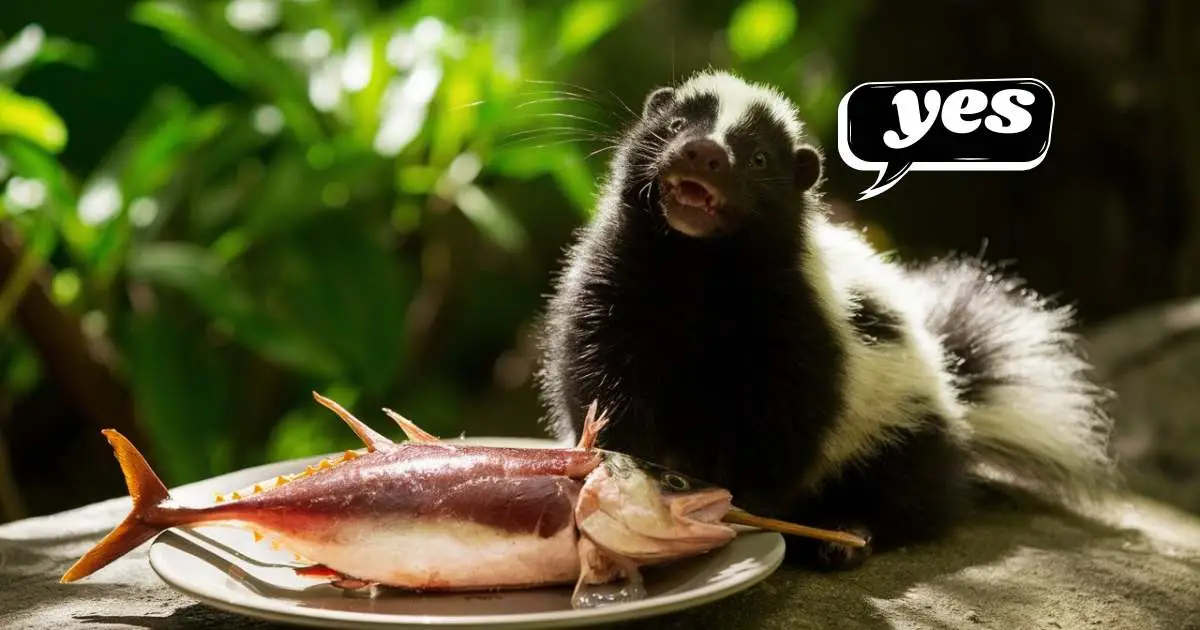Can Skunks Eat Tuna Fish?
Last updated on September 30th, 2024 at 08:59 am
As someone who has studied skunks up close as a pet owner and wildlife observer, I can tell you that skunks will eat tuna, but it’s not their usual snack. Skunks mostly eat bugs, small animals, and fruits, but if they find tuna in their environment, they might just take a bite. Want to learn more about what these curious creatures eat and why giving them tuna might not be the best idea? Keep reading!
The Skunk’s Diet
The Skunk’s Diet: A Peek into Their Culinary World
Ever wondered what skunks munch on during their nocturnal adventures? Their diet is more varied than you might think, and surprisingly, they might even snatch a bite of tuna if given a chance. Let’s delve into the dietary habits of these black-and-white creatures.

Natural Food Sources
Skunks have an interesting array of choices in the wild. They roam at night in search of:
- Insects: Protein-packed snacks like beetles, crickets, and more.
- Fruits: Sweet treats from berries to fallen apples.
- Small Rodents: Occasional mouse or vole for a hearty meal.
- Eggs: Silent raids on nests for fresh eggs.
Omnivorous Appetites
Skunks aren’t picky eaters. They fall under the “omnivore” category, enjoying both plant and animal food:
| Plant-Based Foods | Animal-Based Foods |
|---|---|
| Vegetables | Insects |
| Nuts | Small mammals |
| Fruits | Amphibians and reptiles |
But what about tuna, a seafood delight? Skunks are opportunistic and may eat tuna if they find it. Yet, tuna is not a natural part of their diet.
Tuna As Food
Curious skunks often sniff around for tasty meals. Tuna, a popular fish among humans, might catch a skunk’s attention. But do these striped creatures enjoy tuna? Let’s dive into the nutritional value of tuna and its allure to both wild and domestic skunks.

Nutritional Value
Tuna packs a punch in terms of nutrition. It’s rich in protein, vitamins, and omega-3 fatty acids. These nutrients are crucial not only for humans but potentially for opportunistic eaters like skunks.
| Nutrient | Benefit |
|---|---|
| Protein | Builds muscle and repairs tissue |
| Vitamins | Supports immune system |
| Omega-3 Fatty Acids | Enhances brain function |
Tuna In The Wild Vs. Domestic
Wild skunks may stumble upon fish in their environment, but tuna is not a staple in their diet. Tuna comes from oceans and seas, far from a skunk’s natural habitat.
- Wild skunks eat fruits, insects, and small rodents.
- Ocean fish like tuna are rarely, if ever, on the menu.
Domestic skunks, however, might have different opportunities. Pet skunks may be offered tuna by their owners. This should be a treat, not a regular meal. Tuna for pet skunks should be:
- In small portions
- Free of added salts and oils
- Introduced carefully to avoid digestive issues
Skunks And Opportunistic Feeding
Skunks are well-known for their distinct smell, but their diet is just as interesting. These small mammals don’t just eat insects and plants; they are opportunistic feeders. This means they eat a variety of foods available in their habitat. They have a surprising interest in human food, and yes, that sometimes includes tuna! Let’s uncover how their scavenging habits and adaptability in diet allow for such diverse eating practices.
Scavenging Habits
Skunks have a nose for opportunism. Their nocturnal scavenging can lead them to explore:
- Garbage bins for leftovers
- Compost piles for fruit and veggie scraps
- Outdoor cat or dog food bowls, which often contain tuna-based pet foods
They rely on this flexibility for survival, often roaming into urban areas for an easy meal.
Adaptability In Diet
Skunks don’t shy away from various food sources. They adjust their diet based on:
| Food Type | Examples |
|---|---|
| Animal-based | Insects, rodents, eggs |
| Plant-based | Fruits, nuts, berries |
| Human-related | Leftovers, pet food, including tuna |
This varied diet makes them resilient to changes in food availability and habitat.
Human-skunk Interactions
When it comes to Human-Skunk Interactions, one intriguing question is whether these black and white creatures enjoy a tuna snack. Skunks, known for their pungent spray, often wander into human territories in search of food. Let’s explore the curious dietary habits of skunks and how they can lead to unexpected backyard encounters and the label of pests.
Backyard Encounters
Imagine enjoying a quiet evening when a furry visitor decides to join you. Skunks often visit backyards, drawn by the smells of food. If you leave tuna or other leftovers outside, these animals might come to feast. While skunks are not aggressive, they can spray if startled, so it’s wise to be cautious and keep a distance.
- Keep pet food indoors: Avoid attracting skunks with pet food left outside.
- Secure trash cans: Ensure lids are tightly closed to deter skunk scavenging.
- Limit food scraps: Compost bins should be secure to prevent skunk access.
Skunks As Pests
Skunks dig for grubs and can ruin lawns and gardens, earning them a pest designation. They love easy meals, like an open can of tuna, leading them to become repeat visitors. This can cause headaches for homeowners, as skunk-scented surprises are far from pleasant.
| Prevention Tips | Benefits |
|---|---|
| Install motion-activated lights | Discourage skunks from entering the yard |
| Use skunk repellents | Reduce the likelihood of skunk encounters |
| Seal entrances to crawl spaces | Prevent skunks from nesting under houses |
Potential Risks Of Skunks Eating Tuna
Sometimes, skunks may wander into human territory. They might find tuna a tasty snack. But this could be bad for them. Let’s explore why skunks should avoid tuna.

Health Concerns
Feeding skunks tuna can lead to health problems. These are some risks:
- High sodium levels can cause salt toxicity in skunks.
- Too much fish oil may lead to vitamin E deficiency.
- Skunks could get sick from spoiled or canned tuna.
It’s essential to keep skunks away from tuna to avoid these risks.
Unnatural Diet Effects
Skunks are omnivores. They usually eat insects, plants, and small rodents. Tuna is not in their regular diet. Here’s what happens when they eat it:
| Unnatural Diet Impact | Effect on Skunks |
|---|---|
| Weight gain | Could lead to obesity |
| Nutritional imbalance | Might cause health issues |
| Altered behavior | May become dependent on human food |
Feeding skunks tuna disrupts their diet. We must avoid this for their good.
Attracting Skunks With Tuna
Skunks have a diverse diet but they often can’t resist the strong smell of tuna. Offering tuna might invite these black and white creatures into your yard. While it can be interesting to watch them, skunks are notorious for their stinky spray. Understanding what draws them is key to managing their visits.
Preventing Unwanted Visitors
Keeping skunks away requires strategy and consistency. They are often lured by the scent of food. Securing your trash and removing food offerings are the first steps to discourage visits. These steps help maintain a skunk-free yard:
- Seal garbage cans tightly
- Bring pet food indoors at night
- Install motion-activated lights or sprinklers
Responsible Waste Disposal
Managing waste is crucial to prevent attracting skunks. Proper disposal of food scraps, especially fish like tuna, is necessary. Composting with a secure bin or opting for trash service with locking lids could be effective. These practices ensure a clean and uninviting space for skunks:
| Waste Type | Disposal Method |
|---|---|
| Food Scraps | Secured Compost/Trash Bin |
| Tuna or Fish Remains | Wrapping in Newspaper before Disposal |
| General Household Waste | Trash Service with Locking Lids |
Nature’s Cleanup Crew
The animal kingdom boasts its own janitors, with skunks playing a vital part. These nocturnal creatures are nature’s cleanup crew, feasting on pesky insects and discarded scraps.
Skunks In Ecosystem Balance
Skunks hold a significant place in maintaining ecological harmony. They control insect and rodent populations. This balance is crucial for a healthy ecosystem.
- Insect control: Skunks love eating beetles, bees, and other insects.
- Seed dispersal: By consuming fruits, they spread seeds around.
- Natural scavengers: Eating carrion, they clean the environment.
Human Impact On Skunk Diets
Human activities have altered skunk diets. Urban areas offer skunks new food sources, such as garbage and even fish like tuna.
| Original Diet Items | Human-Influenced Diet Additions |
|---|---|
| Insects | Household trash |
| Fruits and nuts | Leftover human food |
| Small rodents | Accessible pet food |
| Carrion | Canned tuna |
Sometimes, humans unintentionally invite skunks to dinner. Leaving tuna cans outside can attract these creatures. While skunks might enjoy the occasional tuna treat, this isn’t their natural diet and could affect their health and behavior.
Research And Wildlife Experts’ Views
Delving into the dining habits of skunks sparks curiosity about their palate for tuna. With research and insights from wildlife experts, we unveil whether these critters indulge in this fishy feast.
Studies On Urban Wildlife Feeding
Urban environments offer a smorgasbord for skunks, including occasional tuna. Scientists scrutinize how these meals affect wildlife behavior and health. Their findings draw from:
- Field observations: tracking skunk feeding patterns
- Diet analysis: assessing ingested foods
- Impact studies: observing health outcomes
Results show mixed effects of human-provided foods like tuna on skunks.
Expert Recommendations
Wildlife specialists urge caution when considering feeding wild animals. They highlight:
- Ecological balance: natural diets sustain wildlife populations
- Risks to animals: dependency, health issues, and behavior changes
- Human interactions: potential for negative encounters
Experts recommend against feeding skunks tuna, favoring ecosystem preservation over intervention.
Frequently Asked Question
Yes, tuna can attract skunks due to its strong smell. Skunks are drawn to potent odors and will investigate potential food sources like tuna.
The best bait for skunks includes fish, bacon, canned sardines, or cat food. Place these in live traps to attract skunks effectively.
Skunks primarily enjoy a diet of insects, grubs, and larvae. They also regularly consume small mammals, fruits, and plants.
Conclusion
In the dance of skunk diets, tuna isn’t the star — it’s an unusual guest. These creatures typically forage for insects and plants, showcasing nature’s balanced menu. Remember, while an occasional tuna treat won’t hurt, it’s not their go-to meal.
Stick to what’s natural for skunks, and let their wild instincts lead the way.

